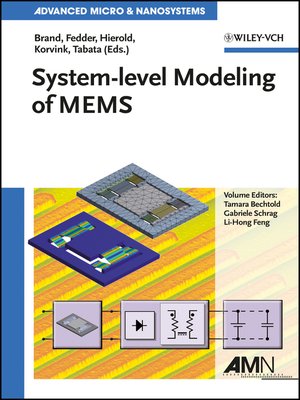
Sign up to save your library
With an OverDrive account, you can save your favorite libraries for at-a-glance information about availability. Find out more about OverDrive accounts.
Find this title in Libby, the library reading app by OverDrive.



Search for a digital library with this title
Title found at these libraries:
| Library Name | Distance |
|---|---|
| Loading... |
System-level modeling of MEMS - microelectromechanical systems - comprises integrated approaches to simulate, understand, and optimize the performance of sensors, actuators, and microsystems, taking into account the intricacies of the interplay between mechanical and electrical properties, circuitry, packaging, and design considerations. Thereby, system-level modeling overcomes the limitations inherent to methods that focus only on one of these aspects and do not incorporate their mutual dependencies.
The book addresses the two most important approaches of system-level modeling, namely physics-based modeling with lumped elements and mathematical modeling employing model order reduction methods, with an emphasis on combining single device models to entire systems. At a clearly understandable and sufficiently detailed level the readers are made familiar with the physical and mathematical underpinnings of MEMS modeling. This enables them to choose the adequate methods for the respective application needs.
This work is an invaluable resource for all materials scientists, electrical engineers, scientists working in the semiconductor and/or sensor
industry, physicists, and physical chemists.
The book addresses the two most important approaches of system-level modeling, namely physics-based modeling with lumped elements and mathematical modeling employing model order reduction methods, with an emphasis on combining single device models to entire systems. At a clearly understandable and sufficiently detailed level the readers are made familiar with the physical and mathematical underpinnings of MEMS modeling. This enables them to choose the adequate methods for the respective application needs.
This work is an invaluable resource for all materials scientists, electrical engineers, scientists working in the semiconductor and/or sensor
industry, physicists, and physical chemists.







